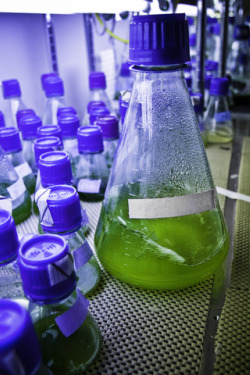The big story of the week, of course, is that BP, after almost three miserable months, may have finally stopped its Gulf gusher. (Emphasis on “may.”) But chances are you missed these greener tales — from the beauty of pond scum to the bendable bike to the regenerative power of beer.
 Flasks of algae waiting to be made into green diesel.Photo: Sapphire EnergyScum and get it: It used to be a term reserved for ex-boyfriends and telemarketers, but now pond scum is feeling the love. For all their (sometimes) stench and sliminess, algae are powerful little engines that convert solar energy into an oily material, and that has once again made them hot properties in the biofuels world. Debora MacKenzie tells the story in New Scientist.
Flasks of algae waiting to be made into green diesel.Photo: Sapphire EnergyScum and get it: It used to be a term reserved for ex-boyfriends and telemarketers, but now pond scum is feeling the love. For all their (sometimes) stench and sliminess, algae are powerful little engines that convert solar energy into an oily material, and that has once again made them hot properties in the biofuels world. Debora MacKenzie tells the story in New Scientist.- Beer … What can’t it do? Later this summer, a plant in the U.K. will start converting waste from a local brewery into energy. The waste from about 600 pints of beer can heat a home for a day. Seems like a lot of quaffing will be needed to make this work. No worries there. Brits gulp at least 28 million pints a day. Get a clear-eyed report at Greenbang.
- There goes the neighborhood: While you were sleeping, a big chunk of Greenland fell into the sea. Scientists say satellite photos from last week revealed that a piece of the giant Jakonbshavn glacier about an eighth the size of Manhattan cracked away and floated out to sea. Larry O’Hanlon, at Discovery News, has more on what it all means.
- And it won the World Cup: Spain passed the U.S. as the largest generator of solar power in the world now that it’s opened a massive solar farm in Alvarado in the western part of the country. The operation, as big as 77 soccer fields, means that Spain now has the capacity to produce as much energy through solar power as through a nuclear plant. Stephen Burgen, writing in The Guardian, fills in the details.
- What if half a billion trees fall in the woods? New analysis reveals that one kick-ass storm that swept across the Amazon five years ago wiped out as many as 500,000,000 trees. Scientists had blamed drought, but now they’re thinking it was one line of severe thunderstorms. And that makes them wonder what will happen as global warming breeds more violent weather. E! Science News assesses the storm damage.
 The bendable bike.Photo: Tony Kyriacou of Rex FeaturesThe bend is near: The latest urban travel innovation is a bike you can wrap around a pole. Brit Kevin Scott has designed a bendable bike that allows you to curl your two-wheeler around a post and lock up both tires at once. Brilliant! See for yourself at Discovery News.
The bendable bike.Photo: Tony Kyriacou of Rex FeaturesThe bend is near: The latest urban travel innovation is a bike you can wrap around a pole. Brit Kevin Scott has designed a bendable bike that allows you to curl your two-wheeler around a post and lock up both tires at once. Brilliant! See for yourself at Discovery News.- All hail the great goby: It’s that time of year when we’re reminded incessantly that great white sharks are pretty awesome. But what about the bearded goby? The fish is only six inches long, but it lives in toxic mud, takes on stinging jellyfish, and is almost singlehandedly keeping an entire ecosystem off the coast of Africa alive — plus, it doesn’t bite humans. Brandon Keim pays homage to the goby’s awesomeness at Wired Science.
- Not so frequent fliers: Germany wants more people to get off planes and onto trains, so it’s considering a tried and true way to encourage the environmentally-friendly transition: Taxes. The German government hopes to start adding a $33 surcharge to any ticket on all outbound flights. Get the details at GreenBiz.com.
- Eat my dust: Scientists have known for awhile that dust storms swirling out of Northwestern Africa are doing damage in the Atlantic Ocean, even to coral reefs as far away as the Caribbean. But new research concludes that the dust problem really intensified beginning in the mid-1800s. That was when people started farming along the southern fringe of the Sahara. Evidence of human activity causing climate change? Could it be? Sid Perkins, writing for ScienceNews, tells the dirty tale.
- They’ve seen the light: So what does a church do about killer energy bills? In Britain, they look to the heavens. British Gas estimates that churches around the country could generate as much as $52 million — most of it through government incentives — by installing solar panels on their roofs. Greenbang sheds some light.


